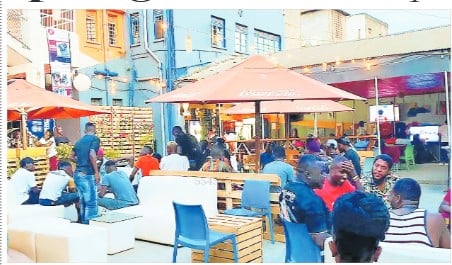Closure of Mbale bar spotlights economy

Revellers at El-Tanjia in Mbale City recently. Established by the Asian community in 1970, the popular nightspot is closing. PHOTO/YAHUDU KITUNZI
What you need to know:
Economists say the closure of El-Tanjia stands as a reminder of the challenges facing traditional nightlife venues in Mbale and beyond
Mbale City, known for its lively nightlife, is bidding farewell to a beloved fixture in its night economy following the recent closure of the traditional El-Tanjia Bar and Club.
Originally known as Elgonia Night Club and established by the Asian community in 1970, the popular nightspot underwent rebranding and took on the name Club Oasis.
In 2013, the nightspot located at Plot 9 Cathedral Avenue was rebranded once more. El-Tanjia was the name the new owners settled with.
More than just your average bar, El-Tanjia was a central hub where locals and visitors gathered to unwind, celebrate, and connect. Its charm lay in its authenticity and ambiance. With its vibrant yet laid-back setting, the bar attracted a wide range of patrons seeking a taste of Mbale’s social life.
“The club has just run out of business. Our boss wants to do something else which will make more money,” Japhet Situma, the manager of El-Tanjia bar and Club, told this publication.
Situma partly blamed the bar’s woes on the hit it took from the Covid-19 pandemic and its attendant curbs. And, indeed, anecdotal evidence indicates that revelers were not so keen on returning to the nightspot after the Covid-19 curbs, including a dusk-to - dawn curfew. Only Thursday and Sunday nights attracted significant crowds.
“The club has been paying Shs6m for rent. This means they were supposed to make a net profit of not less than Shs2m in a month and yet people no longer pay for the club,” James Kutosi, the Mbale City Council spokesperson, revealed.
Bitter pill to swallow For patrons like Fred Amanya, this is a bitter pill to swallow.
“El-Tanjia wasn’t just a bar; it was part of the heartbeat of Mbale. I’ve celebrated birthdays there, watched live bands, and made friends I’ll cherish forever.Losing it feels like losing a part of the community.”
Amanya also fully understands what informed the decision of the El-Tanjia owners.
“While it managed to survive through the lockdowns, the challenges continued to mount as inf lation and rising costs placed increasing pressure on the business. As costs for supplies, rent, and utilities climbed, El-Tanjia’s ability to operate at a profit became difficult, leading to the hard decision to close its doors.”
Jesca Nabulobi, another patron, said the changing entertainment trends have also played a role in the closure of El-Tanjia.
“In recent years, there has been a shift toward smaller, more intimate venues and home gatherings as people look for new ways to socialise.
For some, this shift reflects lingering caution from the pandemic, while others have found new entertainment options that fit their lifestyle,” she observed, adding: “This evolving landscape has made it challenging for traditional venues like El-Tanjia to draw the same crowds they once did.”
A former employee of El-Tanjia, who spoke on condition of anonymity, told Sthis publication that there was a profound sense of loss.
“It’s heartbreaking to say goodbye. We were like family here. We welcomed people from all walks of life, and it feels surreal that this chapter is ending.”
Vestiges of Covid
As Mbale’s nightlife landscape shifts, residents and business owners alike are questioning what the future holds. The city has seen the rise of new venues attempting to adapt to changing tastes. Some have offered different entertainment formats like live p erformances, dining experiences, or themed events.
Yet, for those who cherished the traditional feel of El-Tanjia, there’s uncertainty about whether any new spot can truly replicate its magic.
Economists say the closure of El-Tanjia stands as a reminder of the challenges facing traditional nightlife venues in Mbale and beyond. It is not just nightspots that have been hit where
it hurts. After two years of Covid-19, many small scale businesses in the country still face a difficult recovery route. Pre-2019 revenue figures continue to be a distant memory.
Joining bars among the small-scale businesses negatively impacted by the pandemic are schools, salons, wholesale/retail trade and agricultural undertakings. Stella Ikwakol, a business woman in Mbale City, told this publication that she is already out of business.
“Before Covid-19, I had taken out a loan of about Shs32m from a bank and moneylender, but I failed to pay it following the closure of hotels and bars. I was forced to sell my bar and boutique cheaply in order to pay back the loan,” Ikwakol said.
She said the closure of any small-scale business is disastrous to other related businesses.
“When you close a school, it is interdependent on very many other actors around it, for example, suppliers of food, stationery, financial institutions that give schools loans, and the transporters.”
Barely holding on Uganda’s micro, small and medium enterprises (MSMEs) are “hanging in there” to see the next day, with the majority of them far from being resilient to the pandemic lockdown shock, a rapid assessment study by the Economic Policy Research Centre (EPRC) has established. The assessment is part of a three-year study supported by the International Development Research Centre, Canada (IDRC) to examine the impact of the pandemic on the MSMEs in the country. The aim is to provide timely data to policymakers to respond accordingly.
“People are operating in losses. The number of clients have gone down and the business community is suffering too much to sustain their businesses,” Juliet Naigaga, an entrepreneur, said.
Several analysts said measures such as suspension or deferring some taxes should have been undertaken by the government. In the same spirit, they added, a special fund to support different categories of businesses should be considered. Others are also calling for reduced interest rates, asking the sector regulator to prevail over the banks on this matter.
“Many businesses were affected and majority hotels are pending closure in this region due to accumulated bank loans and other related utilities,” Saleh Naminya, the chief executive officer of Casa Uganda Safaris and Casa Lodges, said.
Joseph Amanya, an economist, said most of Uganda’s micro, small and medium enterprises (MSMEs) closed. He said MSMEs adopted key survival strategies, including laying off workers and cost minimisation, following the second lockdown. This, however, only postponed the inevitable.
Fredrick Opio, a management expert, noted that the “fall in new business, company shutdowns and issues with the supply of raw materials have pushed the Ugandan private sector into contraction.”
He added: “Covid-19 caused issues in supply chains, with difficulties securing raw materials, particularly from China.”
On life support Steven Masiga, the coordinator of Makerere University, Mbale branch, said many businesses “are still on cannulas and intensive care units.”
“Educational institutions are the most hit, with universities registering drastic decline in student turnout. The lockdown of the economy to stop the spread of Covid-19 meant businesses could hardly operate –this meant more job losses, closure of businesses and despair,” he said.
Many MSMEs were battling for survival while others had collapsed by the time President Museveni eased the 42-day lockdown, a survey conducted by the Federation of Small and Medium-sized Enterprises-Uganda (FSME) revealed in July 2021.
The Ugandan economy is emerging from the devastating impact of the pandemic, but prospects for growth are undermined by increasing pressure on its natural resources, according to the World Bank economic analysis for the country in 2021. The 17th edition of the Uganda Economic Update titled “From Crisis to Green Resilient Growth: Investing in Sustainable Land Management and Climate Smart Agriculture” notes that the Covid-19 shock caused a sharp contraction of the economy
to its slowest pace in three decades.
Household incomes fell when firms closed and jobs were lost, particularly in the urban informal sector.
The country’s Gross Domestic Product contracted by 1.1 percent in 2020, and is estimated to have recovered to 3.3 percent during the 2021 fiscal year. Although the government announced a recovery fund for small-scale businesses, many people say they are yet to access it due to prohibitive conditions and lack of information. Now small-scale businesses are appealing to the government to ensure they access start-up grants with no interests so as to revamp their business.
David Balikoowa, an entrepreneur, said people are picking up pieces but are largely stuck in a rut.
“Although the economy was fully opened, many are yet to recover and efforts to acquire start-up capital for small-scale business have failed to yield positive results because they lack collateral security,” Mr Balikoowa disclosed.
MANUFACTURING SECTOR
During the 13th edition of the Eastern Region Trade Fair (ERTF) organised by Uganda Manufacturers Association (UMA) at Mbale Secondary School playground, Mr Deo JB Kayemba, the chairperson of UMA, said the structure of manufacturing in Uganda remains primarily driven by agro-processing and light manufacturing, with emerging heavy manufacturing in areas like steel now integrating the entire value chain from iron ore processing.
“We are fostering stronger ties between manufacturers and agricultural stakeholders, ensuring that the benefits of industrial growth are shared more widely. This initiative not only supports the development of small-scale agricultural enterprises but also helps to secure a steady supply of raw
materials for our manufacturing sector, driving sustainability and growth for both industries,” Mr Kayemba said.
He added that UMA aims to create a more integrated and resilient economic ecosystem that benefits all participants in the value chain.
“The manufacturing sector currently produces products at only 53 percent of installed capacity. Therefore, in an effort to boost production capacity, UMA introduced the trade fairs as a marketing platform for manufacturers to expand their market beyond Kampala. More market access will certainly mean increased production and economic growth,” he said.
The manufacturers said the sector faces recurring challenges, the most significant being the market for products. The revenue performance of the sector was disrupted by the pandemic, with income in 2019/2020 registering a paltry growth of 3.05 percent, a telling decline from 12.9 percent of GDP in 2018/19 and 12.6 percent of GDP in 2019/2020.
While the Finance ministry statistics indicate that there was a growth in revenue effort to 13.5 percent in 2021/2022, anecdotal evidence on the ground indicates otherwise.





